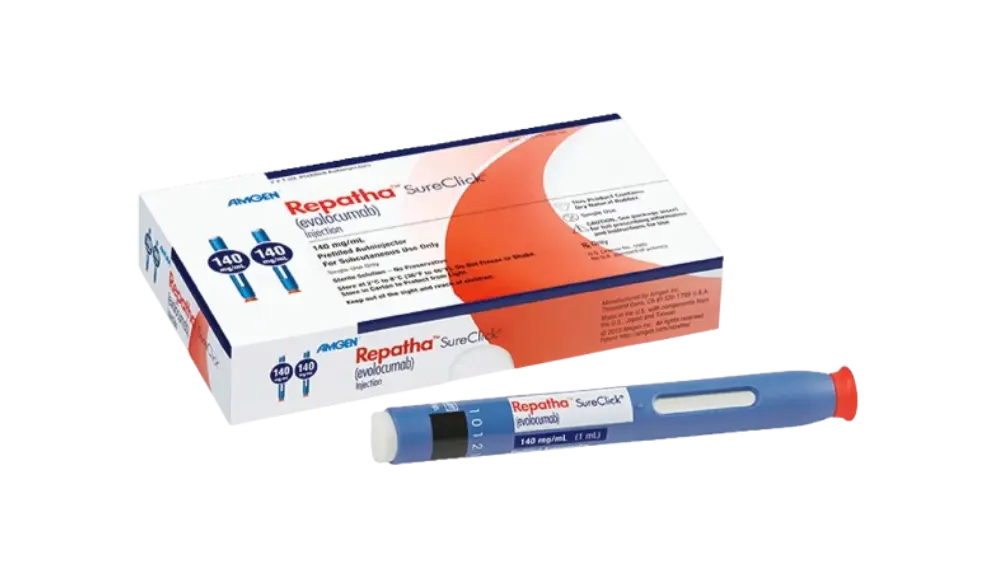Loading...


Repatha is a powerful biologic that helps your body clear LDL cholesterol quickly. It lowers your risk of heart attack, stroke, and plaque buildup. Ideal for those who can’t take statins or need more support.
Repatha lowers LDL and ApoB by 50–60% on average, with results typically seen within 2 to 4 weeks. Backed by large clinical trials and trusted by leading cardiologists.
Our concierge team handles everything: benefit verification, prior authorizations, and guidance on the most affordable cash-pay options if needed.
Your treatment is overseen by board-certified lipidologists who specialize in preventing heart disease. From labs to prescriptions to follow-up, everything is managed for you.
Repatha is a fully human monoclonal antibody that inhibits PCSK9, a protein responsible for degrading LDL receptors in the liver. By preserving these receptors, Repatha enhances the liver’s ability to clear LDL cholesterol from the bloodstream. In clinical trials, it consistently reduced LDL-C by 50–60% and ApoB by 40–50%, even when added to statins or ezetimibe. These reductions occur quickly, remain durable, and are consistent across diverse patient groups.123456
Repatha meaningfully lowers the risk of major cardiovascular events, including heart attacks, strokes, and the need for coronary procedures. This benefit has been demonstrated in both primary and secondary prevention settings, particularly in patients with atherosclerotic cardiovascular disease (ASCVD) or a history of myocardial infarction. Its effect is especially strong in high-risk individuals who are unable to reach LDL-C targets with standard lipid-lowering therapy.123
When used alongside statins, Repatha not only lowers LDL levels but also improves the structure of arterial plaque. Imaging studies show that it promotes regression in plaque volume and enhances plaque stability; reducing features associated with rupture risk. These changes reflect a favorable shift in atherosclerosis biology and support Repatha’s role in long-term vascular protection.12
Repatha has a strong safety profile supported by long-term data from more than 27,000 patients in clinical trials. Adverse effects are generally mild and infrequent, with the most common being injection site reactions, cold-like symptoms, or back pain. Unlike statins, Repatha is not linked to muscle injury, liver enzyme elevation, or worsening blood sugar control, making it ideal for patients who are statin-intolerant or have complex health needs.12



Repatha (evolocumab) is a monoclonal antibody, which means it is a lab-made protein designed to bind very specifically to another protein in the body. In this case, it targets PCSK9, a circulating protein that limits the liver’s ability to remove LDL cholesterol.
PCSK9 normally binds to LDL receptors on liver cells and triggers their destruction. LDL receptors are the molecules that remove LDL cholesterol from the bloodstream. When fewer receptors are available, more LDL stays in circulation, increasing cardiovascular risk.
Repatha blocks PCSK9 from binding to these receptors. This allows more LDL receptors to stay active on liver cells and keep clearing LDL cholesterol from the blood. With more receptors doing their job, cholesterol levels fall significantly.
This mechanism enhances the body’s natural ability to regulate cholesterol and is particularly helpful in patients whose LDL remains high despite other therapies.
Repatha (evolocumab) is an injectable medication that lowers LDL cholesterol by blocking PCSK9, a protein that degrades LDL receptors in the liver. By preventing this breakdown, Repatha increases the number of active receptors that clear LDL cholesterol from the bloodstream, leading to significant reductions in LDL and ApoB.
Unlike daily pills, Repatha is injected either every 2 weeks or once monthly, depending on your preference and prescribed dosing. It’s typically used in people with cardiovascular disease or inherited high cholesterol whose levels remain elevated despite statin therapy.